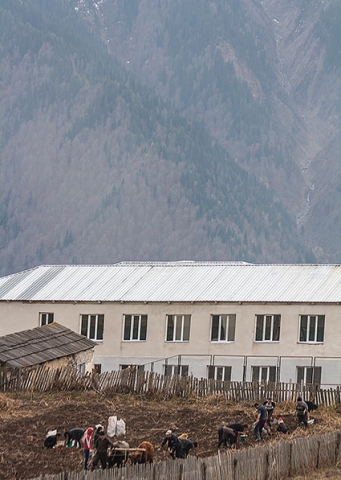Community Spirit: Etseri, Svaneti
This article has a really weird feel in the writing. This is because I'm putting it together in Montreal's Pierre Eliot Trudeau Airport, on my way back to Edmonton, Canada, to deal with a death in the family (more on that elsewhere), while its events concern a similar theme "at home" in Etseri.
Our unmarried close neighbor and friend in Etseri recently lost her sister-in-law, long widowed, with whom she had lived for many years. The two of them had a barn full of cattle and some pigs and poultry, too, plus land with hay, corn and potatoes on it. Far too much for two ladies aged 64 and 70 to deal with, when you add DIY water and firewood splitting and all the other things necessary to village life in Upper Svaneti. And for just one?
So it was wonderful to see the village's name, the Hebrew word for "help," being acted out a few days ago in relation to said potatoes. The widow had recently died suddenly, leaving behind a wake of grief; her funeral feast was over, and it was time to get on with life, somehow, for the elder lady. A field of tubers needed attention before frost could ruin them in the ground. Vital winter food.
Our own potato crop was rather meager this year, needing perhaps for the land to lie fallow; but it was bolstered by my businesswoman wife's clever idea to get back some of our former shop's outstanding debts, not in cash but in the form of the debtors' own potatoes. So our barn coffers were relatively full.
Zoya's potatoes were many more, and much larger, than our own. I went over as early in the day as I could to help with the gathering, in which her nieces and nephews were already active. From there, it only got better.
First, the old dry plants must be scythed out of the way and raked up. Their job was done. Next, you either pitchfork or plow the land to reveal the prize after the months of spring and summer care: plowing, sowing, hoeing. In this case, relatives brought over their steers and plowed them up, by far the faster way. Then many more of us appeared, for suddenly it was a case of "many hands, light work."
Size and quality grading is important. These ones will go to market in Zugdidi, where Svan potatoes are sought after. These are for next spring's seed. These, softened by frost or spade-damaged, or mole-bitten, the pigs will relish. And the rest are for the long winter's consumption. Separate sacks for each kind, separate locations in the barn, where the cattle's warmth will keep them from freezing. We drew them from the earth, piled them up all over the field in a few locations, and began the sorting. Scything and plowing continued here and there, too.
The plowmen took the filled sacks, loaded them onto a Svan sled pulled by the hefty steers, and hauled them off to the barn for storage. And I marveled at the way the whole neighborhood, from seven to seventy, had rallied around bereft Zoya to get her harvest taken care of in record time. Her future plans remain uncertain, but she seems to be in good hands.
Tony Hanmer has lived in Georgia since 1999, in Svaneti since 2007, and been a weekly writer for GT since early 2011. He runs the “Svaneti Renaissance” Facebook group, now with over 1350 members, at www.facebook.com/groups/SvanetiRenaissance/
He and his wife also run their own guest house in Etseri:
www.facebook.com/hanmer.house.svanetilong trek
Tony Hanmer












